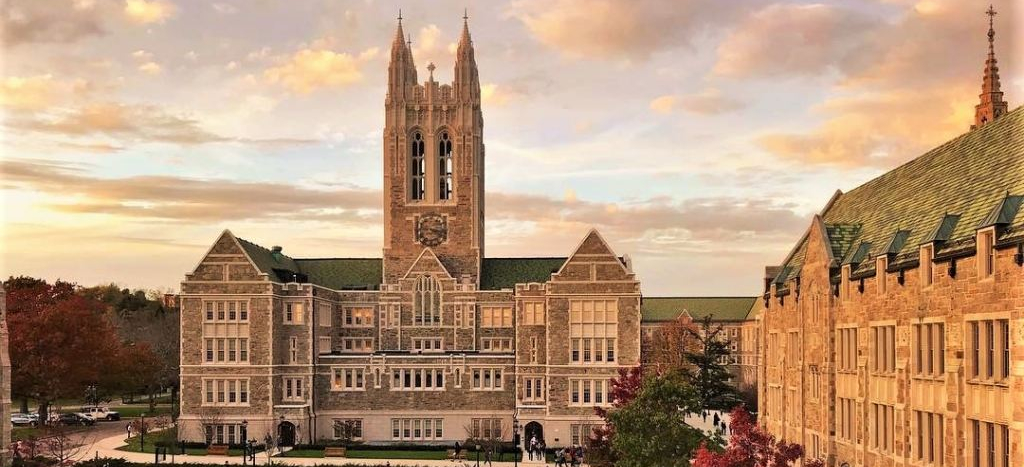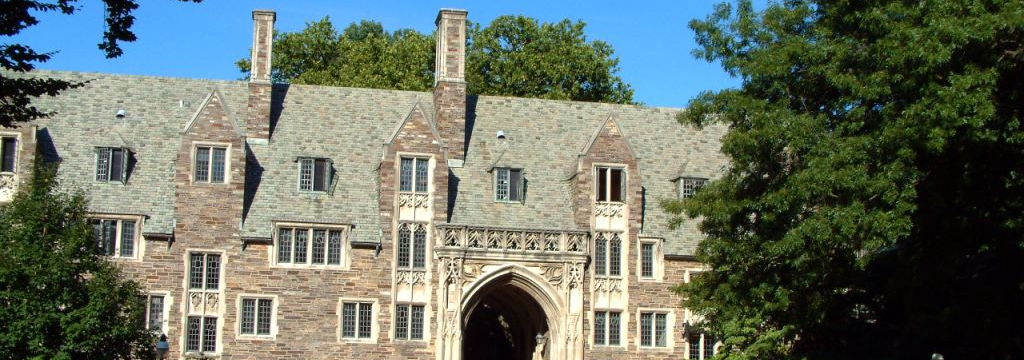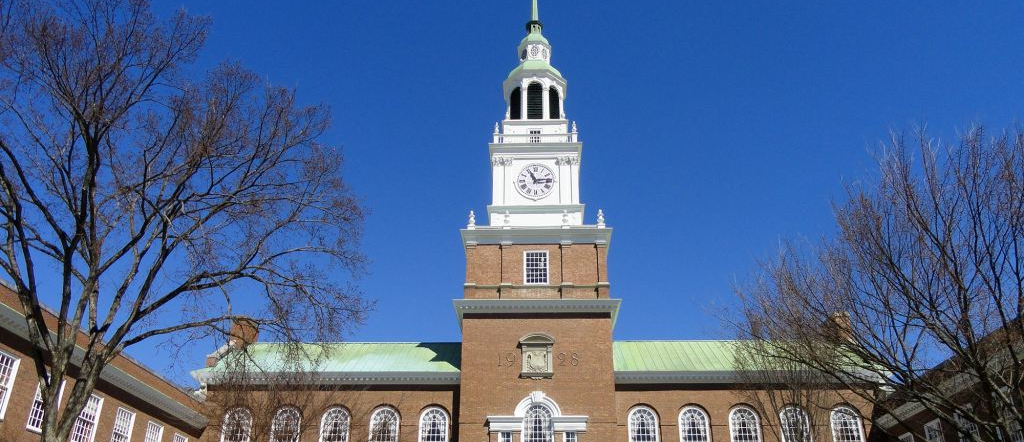As a premier Jesuit research university, Boston College (BC) offers a diverse array of programs, attracting intellectually curious students from around the world. From its picturesque campus in Chestnut Hill — a neighborhood in suburban Newton — to its distinguished faculty, Boston College embodies a commitment to excellence in both scholarship and service.
Founded as a small liberal arts college in 1863 for the purpose of educating Boston’s large Irish Catholic immigrant population, BC gradually expanded its academic offerings to include graduate-level programs and professional schools. If you’re interested in attending Boston College, keep reading to learn what it takes to be accepted.
How to Get into Boston College: Table of Contents
- When to Apply to Boston College
- How Hard Is It to Get into Boston College: Early Prep
- How Do You Actually Get into Boston College: The Application
- Class Profile
- What Makes Boston College Unique?
- Boston College FAQs
When to Apply to Boston College
Because Boston College is such a highly competitive school, it’s important to start your prep as early as possible. BC’s application period begins on August 1, just before rising seniors start their last year of high school. However, you can start drafting your personal statement and compiling your application materials even earlier than that.
Boston College Deadlines
It’s important to keep track of deadlines to ensure Boston College receives your application and supplemental materials on time. The application deadlines for Boston College are subject to change annually but generally fall around the same date each year.
Early, Rolling, and Regular Decision
Most colleges and universities offer application options such as early, regular, and rolling admissions. Early Decision is sometimes offered as two rounds (ED I and ED II) and is a binding application option — students commit to enrolling if they are admitted and withdraw their applications to other schools. Additionally, students who apply ED I or II cannot apply Early Decision to any other schools. Some schools offer a non-binding Early Action option for students who want to demonstrate their commitment to a school by applying early but don’t want a binding agreement.
Regular Decision is a non-binding option that allows students to choose to attend another school if they wish. This is typically the most popular option. Rolling admissions is also non-binding and does not adhere to strict deadlines; however, not every school offers this option.
Of these options, Boston College offers Early Decision I, Early Decision II, and Regular Decision. BC does not offer Early Action or rolling admissions. Students who apply Regular Decision and wish to convert their application to ED II may do so by submitting an Early Decision Agreement form to admissions. Students applying for the 2024-25 academic year had until January 8 to convert from RD to ED II.
Waitlisted Applications
If you apply to Boston College Regular Decision, you will receive one of three decisions: accepted, denied, or waitlisted. If you are waitlisted, it means that BC wants to admit you but does not have the space. You can choose to accept or deny your spot on the waitlist. If you accept, there is a slight chance you may be admitted before fall term starts. For the class of 2026, for example, 7,660 students were waitlisted and only 55 were admitted.
Deferrals
Boston College offers three outcomes to students who apply Early Decision: accepted, deferred, or denied. If you are deferred, it means you are a highly competitive candidate who will be evaluated with the Regular Decision applicants.
You may wonder what to do if you have been deferred. Boston College requires a mid-year grade report to be submitted from your guidance counselor or designated school official. Check with the admissions office to see if they require additional documentation, such as a letter of continued interest. Do not send additional materials unless specifically requested.
How Hard Is It to Get into Boston College: Early Prep
Boston College is a highly selective school with a low admission rate. It can be helpful for you to know the admission rates over the past few years to better understand your chances of being admitted:
- Class of 2025: 18.90%
- Class of 2026: 16.70%
- Class of 2027: 15.45%
- Class of 2028: 14.70%
BC will holistically review all four years of high school, including your academic record and extracurricular activities. The earlier you start preparing, the stronger and more competitive your applicant profile will be.
Build Your Profile
So, what does Boston College look for in their students? They seek smart, motivated, and intellectually curious individuals who are committed to personal growth and community engagement. Your profile should convey to BC admissions that you not only excel academically, but you have made substantial contributions to your school and community through your involvement in clubs, volunteer work, and other activities.
Additionally, your profile should demonstrate your engagement and growth in areas you’re passionate about — what we refer to as being a “pointy” student. Selecting your high school courses and activities to focus on broadening your knowledge and skills in your areas of interest will help you build a pointy profile.
Visit the Campus and a Class
The best way to find out if Boston College is a good fit for you is to visit the campus. Prospective students can register for an Eagle Eye Campus Visit, a two-hour event that includes an information session and student-led tour. You can also register for an Eagle for a Day program, which gives you an opportunity to shadow a BC student, observe a class, and eat lunch on campus.
Can’t make it to campus? Boston College also offers virtual programs. You can register for a 60-minute Eagle Eye Information Session, view the virtual tour, or sign up for a 30-minute virtual chat with a BC student.
Connect With a Student
The best way to learn about student life at Boston College is directly from a current student. If you register for an Eagle Eye Campus Visit, you can ask the student tour guide questions about BC. The Eagle for a Day program allows you to interact more directly with a BC student. A virtual chat is another way for you to learn about student life — just prepare any questions you have in advance, since your chat session is only 30 minutes.
Learn About Any Student Experiences
Take advantage of the opportunities to connect with current students so you can ask them about their experiences. Everyone will experience campus differently, so you may find it worthwhile to speak to multiple students to get a fuller picture of what it’s like to live on campus, attend classes, and participate in events and activities. This can help you further visualize yourself at Boston College to determine if it’s a good fit.
How Do You Actually Get into Boston College: The Application
Boston College uses the Common Application, which you must submit by the deadline along with the writing supplement, high school transcript, and other supporting materials. Students planning to major in studio art have the option of submitting a portfolio through SlideRoom.
Applicants must apply to one of the four undergraduate divisions: the Carroll School of Management, the Lynch School of Education and Human Development, the Morrissey College of Arts and Sciences, or the Connell School of Nursing. You are only considered for admission to the division to which you apply.
GPA Requirements
BC does not have a specific GPA requirement and does not report the GPA of admitted students — however, they do report high school class rank. Of the students admitted to the class of 2026 who submitted their class rank, 90% graduated in the top 10% of their class. This means you will need a strong GPA in the most rigorous courses available to you to be competitive for admission.
SAT and ACT Scores
Standardized test scores are optional at Boston College for the 2024-25 application cycle. That said, strong SAT or ACT scores will make you a more competitive candidate. For Boston College, the middle 50% of admitted students for the class of 2026 had a score range of 1450-1520 for the SAT and 33-35 for the ACT. Boston College superscores the SAT and ACT, ensuring that your strongest section scores among multiple exam dates will be calculated to create a new composite score.
Personal Statement
The Common App personal statement is one of the most important soft factors of your application, allowing you to show the admissions committee who you are beyond your GPA and test scores. You have seven Common App essay prompts to choose from, so you can select the one that you feel best represents you.
Essays
In addition to the Common App personal statement, you also need to submit the Boston College writing supplement. Applicants for the 2023-24 admissions cycle chose one of these four prompts to respond to in 400 words or less:
- Each year at University Convocation, our incoming class engages in reflective dialogue with the author of a common text. What book by a living author would you recommend for your incoming class to read, and why would this be an important shared text?
- At Boston College, we draw upon the Jesuit tradition of finding worthwhile conversation partners. Some support our viewpoints while others challenge them. Who fulfills this role in your life? Please cite a specific conversation you had where this conversation partner challenged your perspective or you challenged theirs.
- In her November 2019 Ted Talk, “The Danger of a Single Story,” Chimamanda Ngozi Adichie warned viewers against assigning people a “single story” through assumptions about their nationality, appearance, or background. Discuss a time when someone defined you by a single story. What challenges did this present and how did you overcome them?
- Boston College’s founding in 1863 was in response to society’s call. That call came from an immigrant community in Boston seeking a Jesuit education to foster social mobility. Still today, the University empowers its students to use their education to address society’s greatest needs. Which of today’s local or global issues is of particular concern to you and how might you use your Boston College education to address it?
Applicants to the human-centered engineering major are asked to respond to a different prompt in 400 words or less. This was the prompt from the 2023-24 admissions cycle:
Human-Centered Engineering (HCE) Applicants only: One goal of a Jesuit education is to prepare students to serve the Common Good. Human-Centered Engineering at Boston College integrates technical knowledge, creativity, and a humanistic perspective to address societal challenges and opportunities. What societal problems are important to you and how will you use your HCE education to solve them?
Letters of Recommendation
Boston College requires a school report and counselor recommendation form, in addition to two teacher evaluations. The best evaluations will come from teachers who know you well and can speak to your character as well as your academic strengths and classroom contributions.
Admission Interviews
Admission interviews are not a part of Boston College’s admission requirements. Prospective students can request a virtual chat with a student through the Eagle for a Discussion program, but it is not an interview, nor is it evaluative for admission purposes.
Contribution to the Boston College Community
Just as you have made contributions to your school and the broader community as a high school student, you will be expected to contribute to the community at Boston College. The hard and soft factors of your application will tell the story of how you will contribute to the BC community both in and out of the classroom, so it’s important to highlight your extracurricular interests and achievements through your personal statement, supplement, and Common App activities list.
Class Profile
You already know college admissions is competitive — especially at highly selective schools — but just how many people apply to Boston College? BC received 36,537 applications for the class of 2027 and ultimately admitted 5,645. Of the students admitted, 8.3% are international students and 38% are AHANA students (African, Hispanic, Asian, and Native American).
| Acceptance rate |
14.70% |
| Class size |
2,335 |
| Undergraduate majors |
50+ |
What Makes Boston College Unique?
“BC is an incredibly close-knit community that takes seriously the Jesuit value on which it was founded,” says IvyWise counselor Cara, who worked in admissions at Boston College. “‘Men and women for others’ is a lived experience, and BC’s presence in various non-profit and service organizations is felt deeply in the surrounding city. Similarly, ‘Cura Personalis,’ or ‘care of the whole self’ is developed by growth and learning across all spheres, not just in the classroom.” Boston College welcomes students of all faiths and may be a good option for civic-minded students who seek a liberal arts education along with numerous research opportunities.
The Chestnut Hill campus is renowned for its Gothic architecture, lush green spaces, and scenic views. Known as “The Heights,” the well-maintained grounds and historic buildings create an inspiring academic environment. Additionally, BC’s proximity to Boston offers students the benefits of a suburban campus with easy access to the cultural, educational, and professional opportunities of a major city. This enhances the student experience with internships, cultural events, and job prospects.
BC offers more than 300 student-run organizations that span a wide range of interests. Students also enjoy a vibrant arts community that includes the McMullen Museum of Art, live performances, film screenings, lectures, and the annual arts festival that brings Boston College and the surrounding communities together. On “Marathon Monday” every April, students get the day off from classes to cheer on the runners of the Boston Marathon as they pass Boston College at Mile 21 — events are held on campus all day to celebrate.
Boston College competes as the Eagles in 31 NCAA Division I teams and is particularly known for football and hockey. Eagles Superfans are easily recognizable by the gold t-shirts they wear during games — one of BC’s best-loved athletic traditions. One of the most anticipated football games each year is the “Holy War” between BC and Notre Dame.
Boston College FAQs
Which is harder to get into: Boston College or Boston University?
Boston College and Boston University are both highly selective schools with competitive admissions. For the class of 2027, Boston College had an admission rate of 15.45%, while Boston University admitted 10.85% from its applicant pool.
What grades do you need to get into Boston College?
BC does not require specific grades; however, the majority of admitted students for the class of 2026 graduated in the top 10% of their high school class. It’s safe to assume that you need strong grades in the most rigorous courses available to you in order to gain admission.
Admission Counseling
College admissions counseling provides significant benefits to both students and parents throughout the complex and often stressful college application process. Admissions counselors have in-depth knowledge of the college application process, including what specific colleges are looking for in applicants. They can help students highlight their strengths, achievements, and unique qualities in a way that makes them stand out in the admissions process.
Boston College is a top-choice school for many, so you must submit the strongest possible application to be considered. If you want to maximize your chances of admission, IvyWise college admissions counselors are here to help. Schedule an Initial Consultation today to learn how we can help you achieve your academic goals.
Get Started




